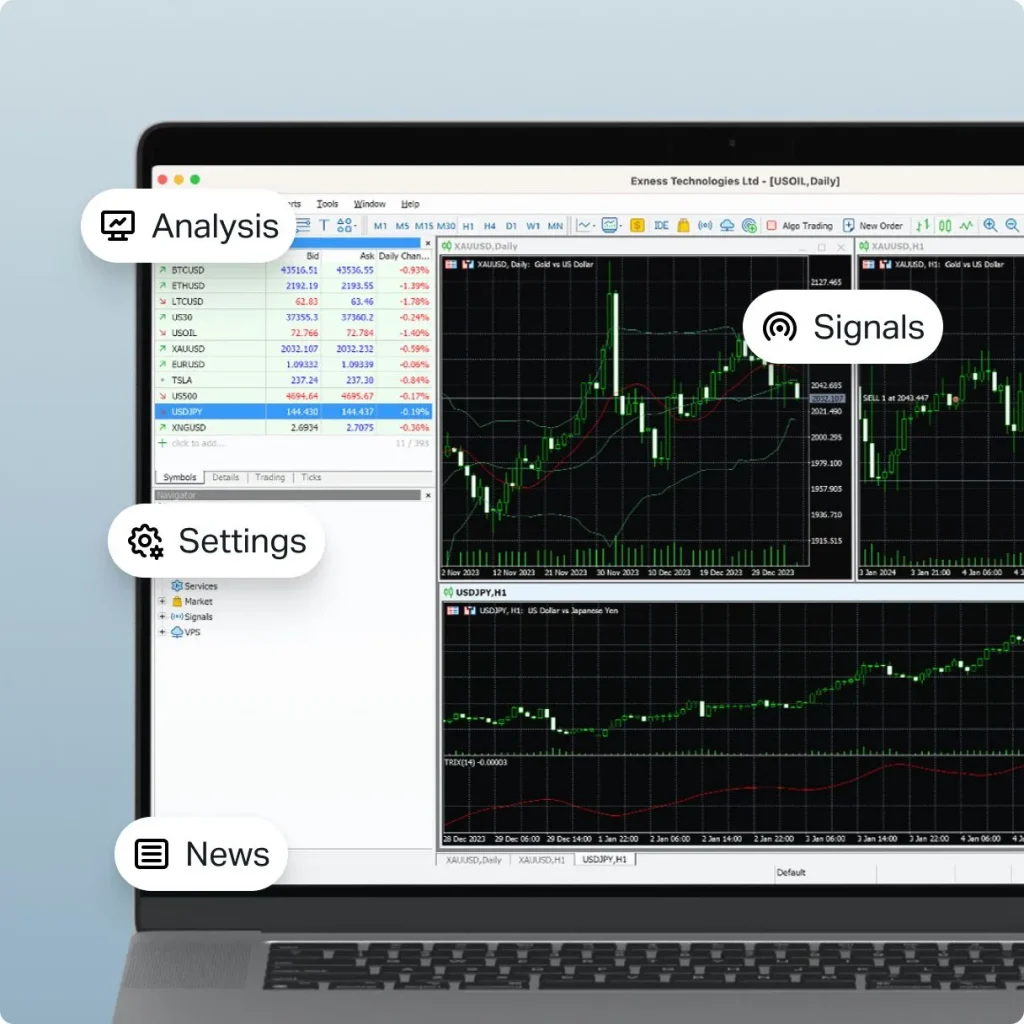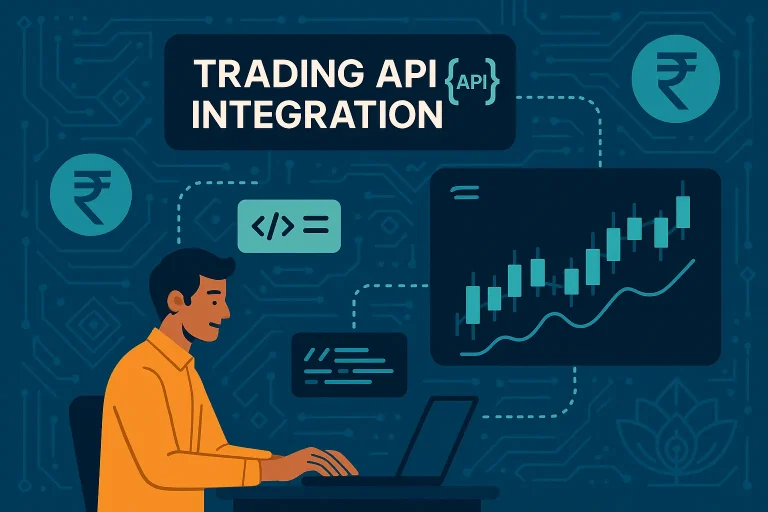Exness Trading API for Indian Developers: Automated Integration Solutions
Home » Exness Trading API
Trading APIs enable developers to create custom trading applications and integrate with our platforms. We provide API access for MetaTrader 4, MetaTrader 5, and web-based solutions. Indian developers can build automated trading systems and analytical tools.
API integration allows real-time market data access, order management, and account monitoring. Custom applications can execute trades, retrieve historical data, and manage multiple accounts simultaneously.
Available API Types and Platforms
We offer multiple API solutions for different development needs and trading platforms. Each API type serves specific use cases and technical requirements.
MetaTrader 4 API Features
MT4 API provides access to trading functions and market data. Developers can create custom Expert Advisors and trading applications using MQL4 programming language.
|
API Feature |
Functionality |
Access Level |
|
Trading Functions |
Order management |
Full |
|
Market Data |
Real-time quotes |
Complete |
|
Account Info |
Balance, equity |
Full |
|
Custom Indicators |
Technical analysis |
Advanced |
MT4 API capabilities:
- Real-time price feed access
- Order execution and management
- Account information retrieval
- Historical data access
MT4 API suits developers familiar with C++ programming concepts. Documentation and community support available for MQL4 development.
MetaTrader 5 API Advantages
MT5 API offers enhanced functionality with improved programming capabilities. Supports multiple asset classes and advanced order types. MQL5 language provides modern programming features.
|
Feature |
MT4 API |
MT5 API |
|
Programming Language |
MQL4 |
MQL5 |
|
Performance |
Standard |
Optimized |
|
Asset Classes |
Forex mainly |
Multi-asset |
|
Debugging |
Basic |
Advanced |
MT5 development benefits:
- Modern programming paradigms
- Better error handling mechanisms
- Enhanced testing environment
MT5 API recommended for new development projects.
REST API and Web Integration
REST API enables web-based applications to integrate with trading platforms. Supports standard HTTP methods for account management and trading operations.
REST API Endpoints
Web API provides RESTful endpoints for common trading operations. JSON format ensures easy integration with modern web frameworks.
|
Endpoint |
Method |
Function |
|
/account |
GET |
Account details |
|
/orders |
POST |
Place order |
|
/positions |
GET |
Open positions |
|
/history |
GET |
Trade history |
Core API endpoints:
- Account information and balance
- Market data and instrument details
- Order placement and management
- Trade history and statements
Authentication methods:
- OAuth 2.0 implementation
- API key authentication
- JWT token validation
Rate limiting specifications:
- 100 requests per minute for market data
- 50 requests per minute for trading operations
- 10 requests per minute for account information
WebSocket Real-Time Data
WebSocket connections provide real-time market data streams and order updates. Low-latency data transmission suitable for trading applications.
|
Data Stream |
Update Frequency |
Latency |
|
Price Quotes |
Tick-by-tick |
<50ms |
|
Order Updates |
Immediate |
<100ms |
|
Account Changes |
Real-time |
<200ms |
WebSocket features:
- Real-time price updates
- Order execution notifications
- Account balance changes
- Market depth information
WebSocket ideal for applications requiring real-time market monitoring.
API Authentication and Security
Secure authentication protects trading accounts and prevents unauthorized access. Multiple security layers ensure API usage remains safe.
Authentication Methods
Choose appropriate authentication methods based on application requirements and security needs.
|
Auth Method |
Security Level |
Use Case |
|
API Key |
Medium |
Server applications |
|
OAuth 2.0 |
High |
User applications |
|
JWT Tokens |
High |
Mobile apps |
Security best practices:
- Use HTTPS for all API communications
- Validate all input parameters
- Log API access for monitoring
- Set appropriate timeout values
Store authentication credentials securely. Never expose API keys in client-side code.
Rate Limiting and Quotas
API rate limits prevent abuse and ensure fair usage. Different endpoints have varying rate limits based on resource requirements.
|
Request Type |
Limit |
Window |
|
Market Data |
1000/min |
1 minute |
|
Trading |
100/min |
1 minute |
|
Account Info |
60/min |
1 minute |
Quota management strategies:
- Implement exponential backoff
- Cache frequently accessed data
- Use WebSocket for real-time data
Design applications to handle rate limit responses gracefully.
Trading Operations via API
Execute trading operations programmatically through API endpoints. Place orders, manage positions, and monitor trade execution.
Order Management Functions
API supports all standard order types available on trading platforms.
|
Order Type |
Execution |
Use Case |
|
Market |
Immediate |
Quick entry/exit |
|
Limit |
At price |
Better fills |
|
Stop |
Breakout |
Trend following |
|
Stop Loss |
Protection |
Risk control |
Order placement parameters:
- Trading symbol (e.g., EURUSD)
- Order type and direction
- Volume in lots
- Price levels (if applicable)
Order modification capabilities:
- Change price levels
- Adjust volume amounts
- Cancel pending orders
Validate all order parameters before submission.
Position Monitoring
Track open positions and monitor profit/loss in real-time. API provides detailed position information.
|
Position Data |
Update Frequency |
Calculation |
|
Unrealized P&L |
Real-time |
(Current – Entry) × Volume |
|
Swap |
Daily |
Interest differential |
|
Commission |
At open |
Broker fee |
Position management functions:
- Retrieve all open positions
- Filter positions by symbol
- Calculate total exposure
- Close positions partially or fully
Monitor position correlation to avoid excessive risk concentration.

Market Data Access
Retrieve real-time and historical market data through API endpoints. Access price quotes and historical information.
Real-Time Price Feeds
Stream live price quotes for all available trading instruments.
|
Data Field |
Description |
Update Rate |
|
Bid Price |
Selling price |
Tick-by-tick |
|
Ask Price |
Buying price |
Tick-by-tick |
|
Last Price |
Recent trade |
Per trade |
Price feed features:
- Bid/ask prices with timestamps
- Daily high/low/open prices
- Trading session status
Stream only required symbols to minimize bandwidth usage.
Historical Data Retrieval
Access historical price data for backtesting and analysis purposes.
|
Timeframe |
Max History |
Data Points |
|
M1 |
2 years |
1M+ |
|
H1 |
10 years |
87K+ |
|
D1 |
20 years |
7K+ |
Available timeframes:
- M1, M5, M15, M30: Intraday analysis
- H1, H4: Short-term trends
- D1: Daily analysis
Historical data fields:
- Open, high, low, close prices
- Tick volume information
- Timestamp in UTC format
Development Tools and SDKs
We provide software development kits to accelerate API integration. Pre-built libraries support popular programming languages.
Programming Language Support
Official SDKs available for major programming languages used in trading applications.
|
Language |
Official SDK |
Difficulty |
|
Python |
Yes |
Low |
|
JavaScript |
Yes |
Low |
|
Java |
Yes |
Medium |
|
C# |
Yes |
Medium |
Python SDK features:
- Pandas integration for data analysis
- Comprehensive error handling
- Unit test coverage
JavaScript SDK capabilities:
- Node.js server applications
- WebSocket connection management
- TypeScript definitions
Choose SDK based on your development environment and team expertise.
Testing Environment
Sandbox environment provides safe testing without affecting live trading accounts.
|
Test Category |
Focus Area |
Duration |
|
Unit Tests |
Individual functions |
Minutes |
|
Integration |
API connectivity |
Hours |
|
Load Testing |
Performance limits |
Hours |
Sandbox features:
- Identical API endpoints
- Virtual trading funds
- Real market data
- No financial risk
Testing best practices:
- Test all error scenarios
- Validate data parsing logic
- Verify order execution flows
Thorough testing prevents costly production errors.
Use Cases and Applications
API integration enables various trading applications and business solutions.
Algorithmic Trading Systems
Build algorithmic trading systems using API integration. Implement strategies with multiple timeframes and instruments.
|
Algorithm Type |
Data Requirements |
Execution Speed |
|
Scalping |
Tick data |
<100ms |
|
Day Trading |
1-5 min bars |
<1 second |
|
Swing Trading |
Hourly data |
<10 seconds |
Algorithm components:
- Market data processing
- Signal generation logic
- Risk management rules
- Order execution engine
Performance optimization:
- Use WebSocket for real-time data
- Implement local data caching
- Optimize algorithm calculations
H3: Portfolio Management Applications
Create portfolio management tools for multiple account monitoring.
Portfolio features:
- Multi-account aggregation
- Performance analysis
- Risk metrics calculation
- Automated reporting
Dashboard components:
- Real-time P&L monitoring
- Position allocation charts
- Risk exposure analysis
Risk management integration ensures portfolio stays within predefined limits.
Frequently Asked Questions
What programming languages are supported for API development?
We provide official SDKs for Python, JavaScript, Java, and C#. Community libraries support additional languages.
Is there a sandbox environment for testing?
Yes, we provide a sandbox environment with virtual funds and real market data for safe testing.
What are the API rate limits?
Trading operations are limited to 100 requests per minute. Market data requests have higher limits of 1000 per minute.
Can I access historical data through the API?
Yes, historical data is available for all instruments across multiple timeframes up to 20 years.
How do I handle API authentication securely?
Use HTTPS for all communications, implement proper API key rotation, and never expose credentials in client-side code.


